Do the caucuses matter? In the back room of a rural diner, these Iowans show how they do.
![Jan 15, 2024; Garnavillo, Iowa, [USA]; More than 70 registered Republicans showed up to caucus on Monday, Jan. 15, 2024, at the Thoma Dairy Bar Cafe in Garnavillo, Iowa. Mandatory Credit: Bryon Houlgrave-The Des Moines Register](https://s.yimg.com/ny/api/res/1.2/9YgMusr68uhOwIHC5UCz2g--/YXBwaWQ9aGlnaGxhbmRlcjt3PTEyNDI7aD04Mzg-/https://media.zenfs.com/en/aol_gannett_aggregated_707/7467f1c7d483b83e2348f7a48b30c261)
GARNAVILLO, Iowa — In the back dining room of Thoma Dairy Bar, a ma-and-pop diner known for its hearty egg-and-bacon-and-toast-and-cheesy-hashbrown breakfasts served with pancakes as big as garbage can lids, about 70 people, nearly 10% of the town of Garnavillo in extreme eastern Iowa, gathered for a caucus that lacked the pomp and circumstance ― and national media glare ― of many other sites Monday night.
A handful of red Trump hats, weathered and worn from obviously regular outings, marked the most political glitz on display, and, in the hour-and-a-half-long event, the presidential preference poll took mere minutes.
A letter sent by Ryan Binkley’s campaign and read with little gusto by the precinct chair was the most speaking done for any candidate. After a woman spoke for less than a minute for Florida Gov. Ron DeSantis, “just to say something,” no one in the standing-room-only crowd raised a word for any of the other candidates in the field.
They'd come with their vote in mind, ready to circle their pick on the simple blind ballots later tabulated on the 75-year-old ice cream counter.
And the results were reflective of much of the state's: former President Donald Trump took the precinct with 45 votes, the vast majority. DeSantis came in second with 15, Vivek Ramaswamy got five, Nikki Haley took four, and Asa Hutchinson rounded out the total with a single vote.
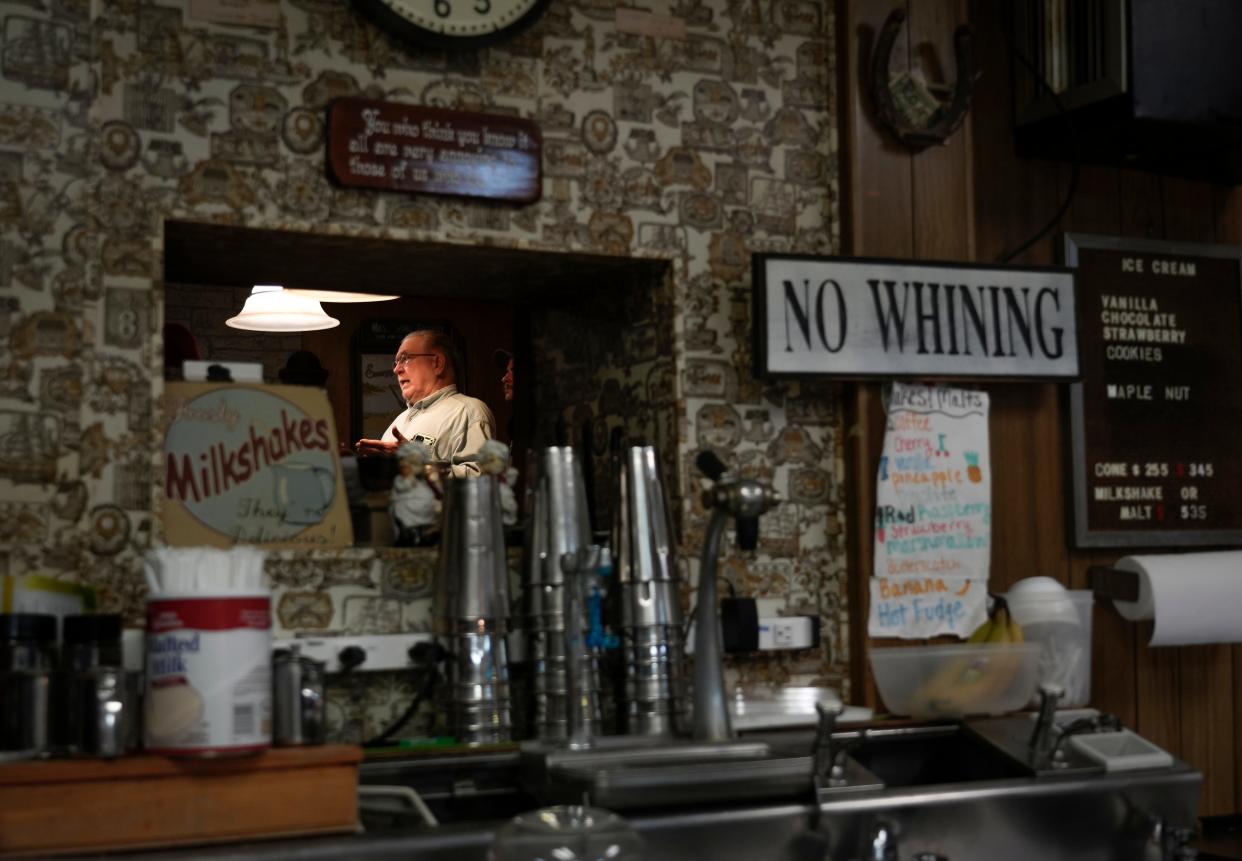
For many pundits, poll watchers and members of the national media who planned to take off in chartered flights to New Hampshire or one of the coasts before this column is even published, that ranking would be the end of the story. In the general elections, this rural county handed Barack Obama the White House twice and then swung red in 2016 to give the win to Trump and went redder in 2020, casting nearly double the amount of votes for Trump as for President Joe Biden. Monday's caucus results showed the county is, well, still very red.
Fade to black. Cut to commercial. Three, two, one, and we’re off.
But that’s just barely skimming the surface. The real heart of the caucus, the reason that this weird, oh-so-American tradition isn’t worth giving up on just yet, happened for the next hour-plus in the detailed and vigorous discussions of what this group wanted to include as their platform’s planks — as they debated the issues written on their hearts and minds and struggled with what they wanted done about it all.
“I care about issues a lot more than presidents,” said Spencer Gull, 25, a member of the National Guard. “And if you're not actually engaging in topics at the local level, then you can't really say that you're trying to better the community.”
“I think that our extended discussion sends a signal here that we know what we value versus just having an emotional reaction to things we see on the news or on social media,” he continued. “We’re talking about the issues, with our neighbors, that actually affect our life.”
And the issues ran the gamut from term limits for federal representatives and senators to improving the electrical grid to banning members of Congress from trading stocks or exempting themselves from laws passed to reinforce the spirit and language of the Second Amendment through a protection act.
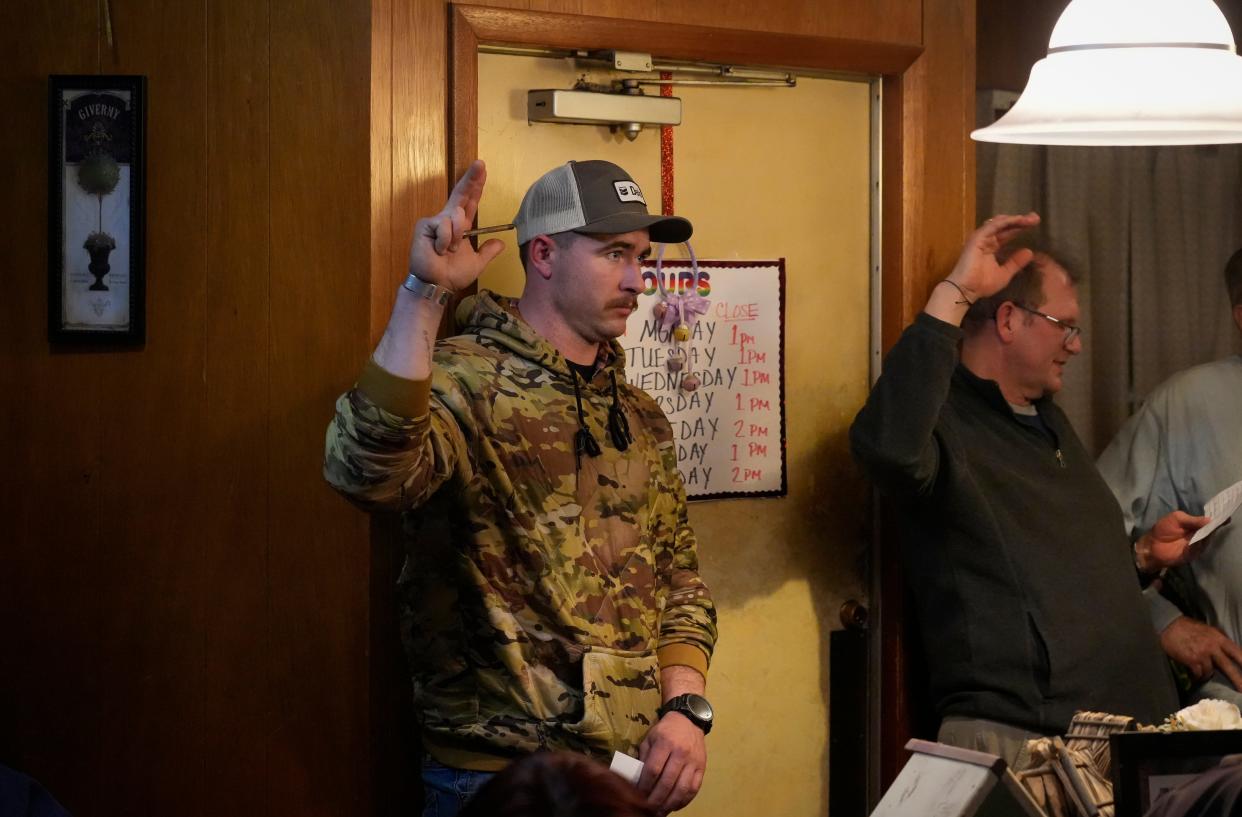
A suggestion of "better border protection" was clarified by the group to include finishing the wall as well as enforcing immigration laws that are already on the books.
"No political donations from corporations" was amended to be "no political contributions to campaigns from people or corporations outside the district represented."
The fear of China buying American farmland was addressed in a possible plank outlawing foreign real estate sales.
Is that really American? said a man in the back, setting off lively debate. I mean, I can buy land in Western Europe or plenty of other places around the world.
In this section of the breadbasket, he did not coax anyone to his side, and the plank passed.
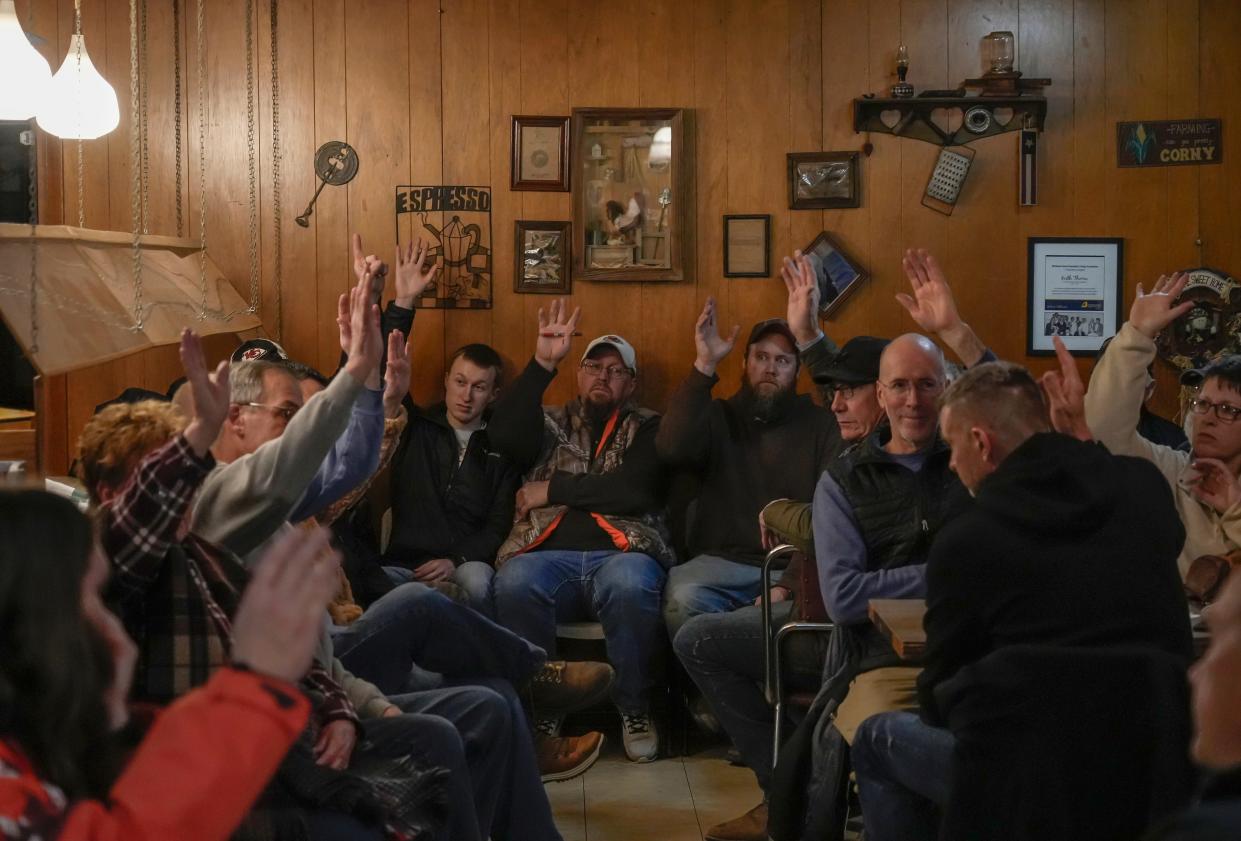
And when a woman suggested the party revoke the current school funding system, which she says penalizes rural schools, the room pushed back.
Do you mean pay more in taxes?
That’s sort of vague; how can we be more specific?
Is this about school choice?
The settled-on a plank was to look into rural sustainability in education to ensure children in the reaches are treated fairly.
For all those media personalities seeking out the elusive “kitchen table,” the average voter in their average locale, here it was, on display, in a no-fuss diner where the coffee is still 50 cents — if he even remembers to charge you for a cuppa — and a rotating pie menu featuring current flavors sour crème raisin, eggnog meringue and, of course, apple.
The caucuses are supposed to be a throwback to prairie town meetings where everyone gathered in the community center to suss out problems and take a vote and make plans. They are the vestige of village life in Germany and Sweden and the European countries people came from before they set off to wrestle America into ordered homesteads and farmlands.
County soup suppers, meet-and-greets at main street diners, speeches at local fellowship halls, they were all quaint ways to get to know people who wanted to lead. But as the caucuses grew into a spectacle, these quaint meetings became caricatures — as they were this year when DeSantis attended a Des Moines wedding, walking into the reception seemingly alongside with the bride and groom, or when Ramaswamy insisted on hosting events in a snowstorm and had to be pulled from a ditch by a winterized Iowan.
Get a picture. Post it to Instagram. Make sure you look relatable.
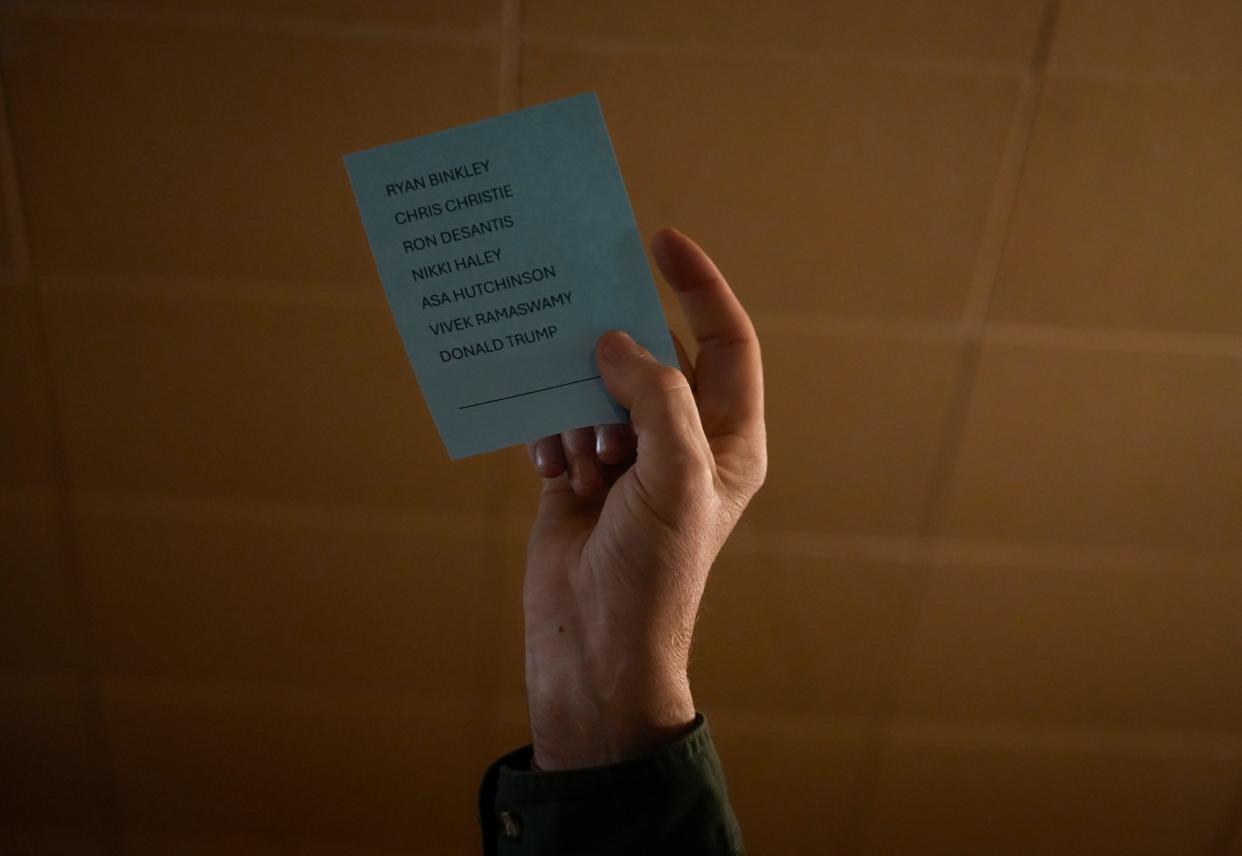
But little more than a week since a devastating school shooting in rural Iowa and the knitting together that happens in the wake of anything so shocking, and days after a snowstorm followed by a blizzard and subzero temperatures, Iowans gave up their time and their energy to abandon echo chambers and discuss topics and pick nominees in public. They didn't passively engage — just writing a check or snarking on social media — they spoke with their feet and their hearts.
In “arctic cold,” no less.
The caucuses are meant to be politics at the lowest common denominator. They are a moment when policies are drafted by the people, for the people and of the people.
They are a time when individuals can be included in the bedrock of our American culture; a time when their choices can be seen and their voices heard.
They are a process meant to form a powerfully connected community, not to satisfy the insatiable need to bet on the next horse race.
And they do that — if you only pay attention.
“There are a lot more people here than last time,” remarked Linda Kuehl, 76, a retired X-ray technician. And her table speculated that was probably true at the other 10 caucus cites in Clayton county, mostly schools and community centers, but also a fire station 13 miles south and a local bank in the county seat.
Just before the caucus broke up, a final plank suggestion was the only one roundly rejected.
Majority rules, and the Republicans who caucused in this precinct had no interest in legalizing cannabis.
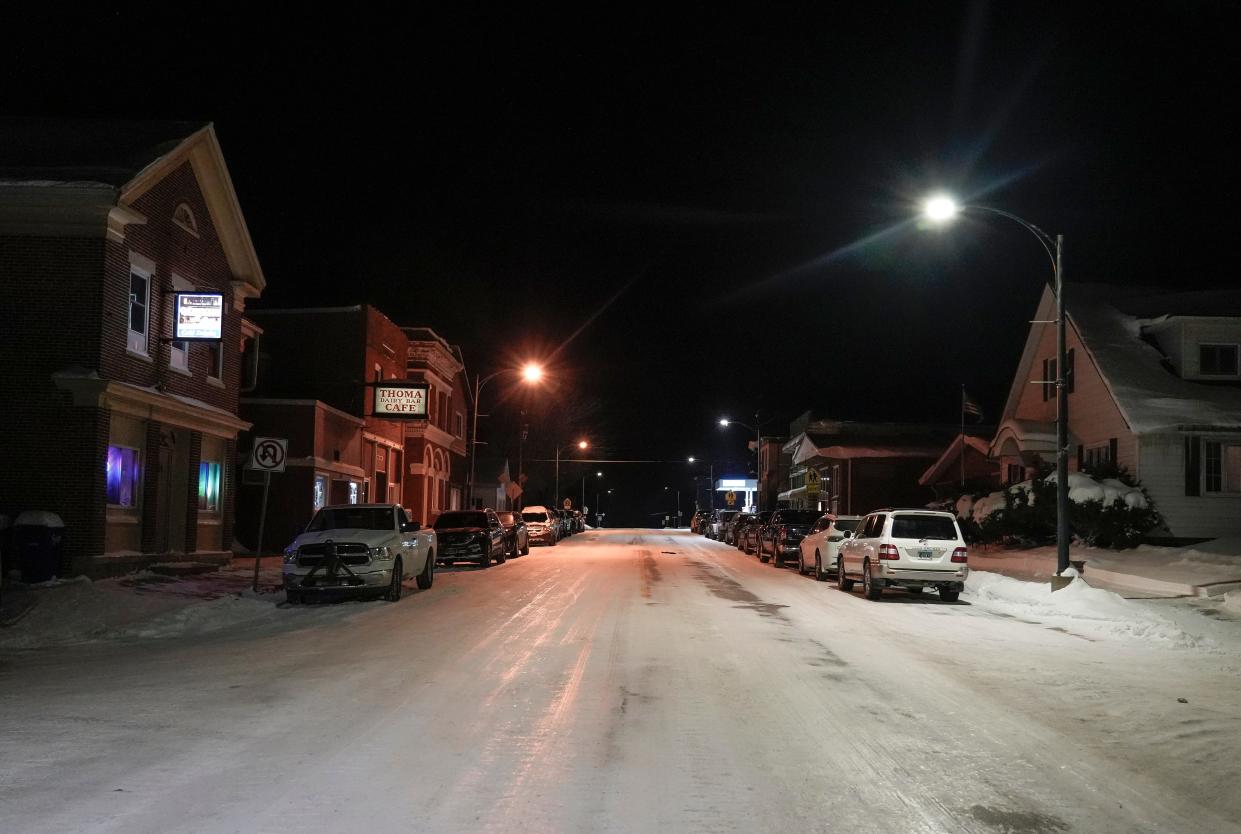
Courtney Crowder, the Register's Iowa Columnist, traverses the state's 99 counties telling Iowans' stories. Reach her at ccrowder@dmreg.com or 515-284-8360.
This article originally appeared on Des Moines Register: Iowa Caucuses: Do the caucuses matter? One rural county shows they do.
